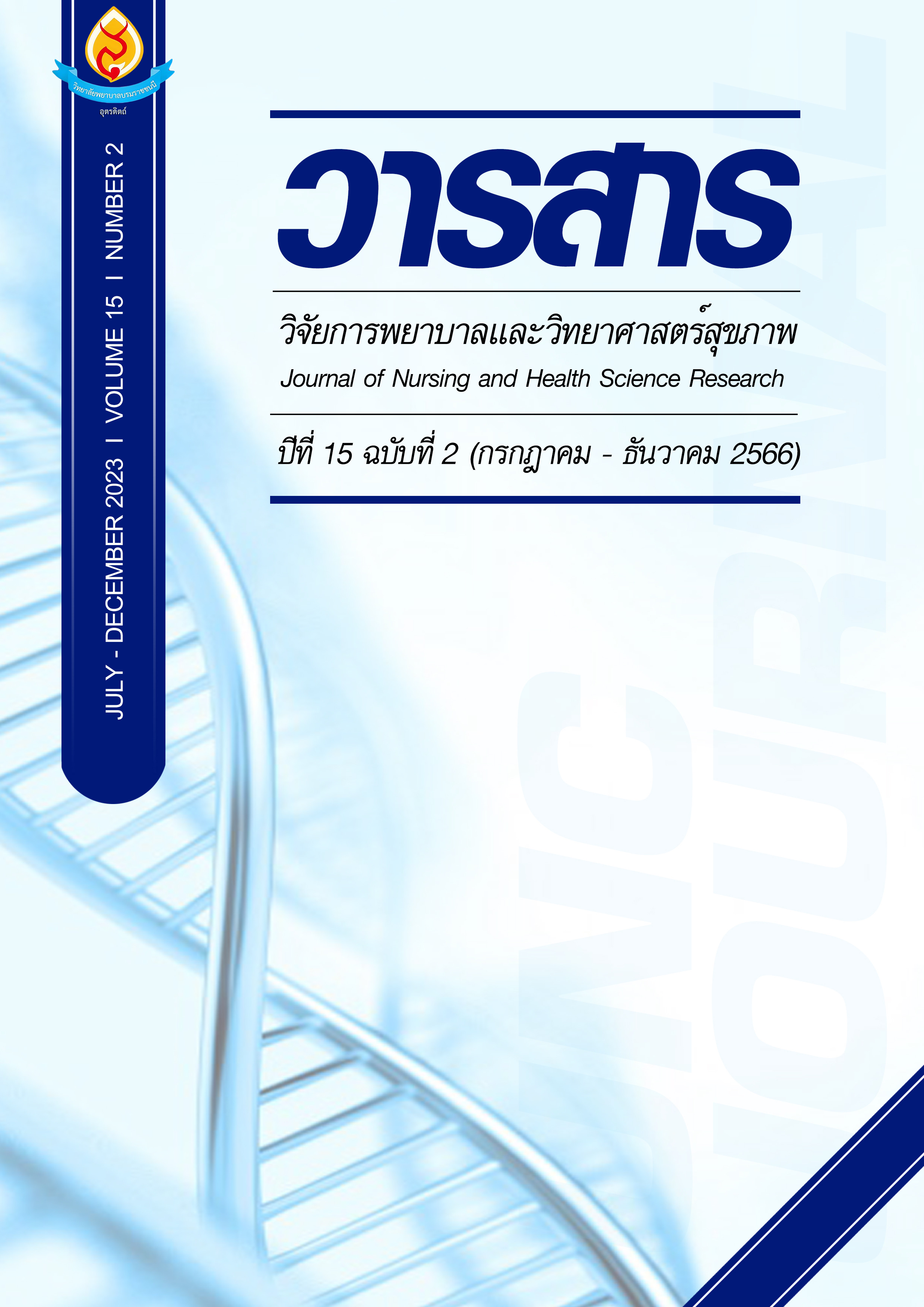ผลของโปรแกรมการดูแลอย่างต่อเนื่องต่อการรับรู้สมรรถนะแห่งตน ของผู้ดูแลผู้ป่วยบาดเจ็บสมองระดับเล็กน้อย
Main Article Content
บทคัดย่อ
การวิจัยแบบอนุกรมเวลามีกลุ่มเปรียบเทียบ (Interrupted time series design with a comparison group) นี้ มีวัตถุประสงค์เพื่อศึกษาผลของโปรแกรมการดูแลอย่างต่อเนื่องต่อการรับรู้สมรรถนะแห่งตนของผู้ดูแลผู้ป่วยบาดเจ็บสมองระดับเล็กน้อยที่โรงพยาบาลแพร่ กลุ่มตัวอย่าง คือ ผู้ดูแลผู้ป่วยที่ได้รับการวินิจฉัยจากแพทย์ว่าบาดเจ็บสมองระดับเล็กน้อยและมีความเสี่ยงในระดับปานกลางและสูงที่เข้ารับการรักษาที่โรงพยาบาลแพร่ จำนวน 40 คน แบ่งเป็นกลุ่มทดลองและกลุ่มควบคุม กลุ่มละ 20 ราย เครื่องมือวิจัย ประกอบด้วย 1) โปรแกรมการดูแลอย่างต่อเนื่อง 2) คลิปวิดีโอ 3) คู่มือการดูแลผู้ป่วยบาดเจ็บสมองระดับเล็กน้อย ผ่านผู้ทรงคุณวุฒิ 5 ท่าน ค่าดัชนีความตรงตามเนื้อหาได้ 1 และ 4) แบบประเมินการรับรู้สมรรถนะแห่งตนในการดูแลผู้ป่วยบาดเจ็บสมองระดับเล็กน้อย หาค่าความเที่ยงได้ .92 วิเคราะห์ข้อมูลด้วยสถิติพรรณนา สถิติทดสอบ Wilcoxon และ Friedman
ผลการวิจัยพบว่า 1) ผู้ดูแลในกลุ่มทดลองมีค่าเฉลี่ยของคะแนนการรับรู้สมรรถนะแห่งตนสูงกว่าก่อนได้รับโปรแกรมการดูแลต่อเนื่อง ในสัปดาห์ที่ 1, 4 และ 6 อย่างมีนัยสำคัญทางสถิติที่ระดับ .001 2) ผู้ดูแล ในกลุ่มทดลองมีค่าเฉลี่ยของคะแนนการรับรู้สมรรถนะแห่งตนสูงกว่ากลุ่มควบคุม ในสัปดาห์ที่ 1, 4 และ 6 อย่างมีนัยสำคัญทางสถิติที่ระดับ .001
ผลการศึกษานี้แสดงให้เห็นว่าโปรแกรมการดูแลอย่างต่อเนื่องสามารถเพิ่มการรับรู้สมรรถนะแห่งตนของผู้ดูแลหลังจำหน่ายในสัปดาห์ที่ 1, 4 และ 6 ซึ่งบุคลากรทีมสุขภาพสามารถนำโปรแกรมการดูแลต่อเนื่องไปประยุกต์ใช้การดูแลผู้ป่วยบาดเจ็บสมองระดับเล็กน้อยเพื่อปรับปรุงคุณภาพของการพยาบาลให้เพิ่มขึ้นได้
Article Details

อนุญาตภายใต้เงื่อนไข Creative Commons Attribution-NonCommercial-NoDerivatives 4.0 International License.
บทความหรือข้อคิดเห็นใดใดที่ปรากฏในวารสารวิจัยการพยาบาลและวิทยาศาสตร์สุขภาพ เป็นวรรณกรรมของผู้เขียน ซึ่งบรรณาธิการหรือสมาคมศิษย์เก่า ไม่จำเป็นต้องเห็นด้วย และบทความที่ได้รับการตีพิมพ์เผยแพร่ถือเป็นลิขสิทธิ์ของวารสารวิจัยการพยาบาลและวิทยาศาสตร์สุขภาพ
เอกสารอ้างอิง
Arundon, K., Anumus, N., Chunthong, P., Cheevarungrod, A., Phibalsak, T. & Lim, A. (2020). Effect of using a head injury fast-track system on reducing the mortality rate among severe head injury patients in Southern Thailand: A retrospective study with historical control. International Journal of Critical & Injury Science, 10(4), 177-181.
Bandura, A. (1997). Social foundations of thought and action (A social cognitive theory). New Jersey: Prentice-Hall.
Corrigan, J. D. (2021). Traumatic brain injury and treatment of behavioral health conditions. Psychiatric Service, 72(9), 1057-1064.
Firmawati, E., Songwathana, P. & Kitrungrote, L. (2014). Effect of self-efficacy enhancing education program on family caregivers’ competencies in caring for patients with mild traumatic brain injury in Yogyakarta, Indonesia. Nurse Media Journal of Nursing, 4(2), 767-783.
Garner, R. C. & Yaffe, K. (2015). Epidemiology of mild traumatic brain injury and neurodegenerative disease. Molecular and Cellular Neuroscience, 66, 75-80.
Lum, P. (2017). The effects of a continuing care program on the perceived self-efficacy of caregivers and post-concussion syndrome in persons with mild traumatic brain injury. (Master’s thesis). Thammasat university. (in Thai).
Lum, P., Harnirattisai, T. & Tantongtip, D. (2019). The effects of a continuing care program on the perceived self-efficacy of caregivers and post-concussion syndrome in persons with mild traumatic brain injury. Ramathibodi Nursing Journal, 25(1), 58-73. (in Thai).
Ontario Neurotrauma Foundation. (2018). Guideline for concussion/mild traumatic brain injury & prolonged symptoms. Retrieved from http://concussion_guideline_3rd_eition_final2018.pdf
Polinder, S., Cnossen, M. C., Real, R. G. L., Covic, A., Gorbunova, A., Voormolen, D. C., Master, C. L., Haagsma, J. A., Diaz-Arrastia, R. & Steinbuechel, N. (2018). A multidimensional approach to post-concussion symptoms in mild traumatic brain injury. Frontiers in Neurology, 9, 1-14.
Polit. D. F. & Gillespie, B. (2009). The use of the intention to treat principle in nursing clinical trials. Nursing Research, 58(6), 391-399.
Rasmussen, M. S., Arango-Lasprilla, J. C., Andelic, N., Nordenmark, T. H & Soberg, H. L. (2020). Mental health and family functioning in patients and their family members after traumatic brain injury: A cross-sectional study. Brain Sciences, 10, 670.
Rooplor, S., Leethong-in, M. & Piyawattanapong, S. (2021). Effects of the self-efficacy enhancing program on the practice behavior of caregivers for the older patients with mild traumatic brain Injury after discharge and post-concussion syndrome. Srinagarind Medical Journal, 36(5), 617-624.
The Royal College of Neurological Surgeons of Thailand. (2019). Clinical practice guideline for traumatic brain injury. Bangkok: Prosperous Plus. (in Thai).


